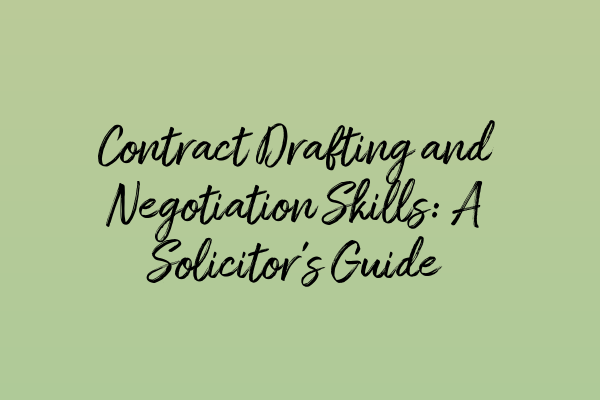Contract Drafting and Negotiation Skills: A Solicitor’s Guide
Contract drafting and negotiation are essential skills for a solicitor. Whether you are representing a client in a business transaction, employment agreement, or even a simple lease agreement, your ability to draft and negotiate contracts effectively can make a significant difference in achieving your client’s desired outcome.
In this comprehensive guide, we will explore the key principles and techniques of contract drafting and negotiation that every solicitor should master. We will provide practical tips and strategies to help you streamline the process, ensure clarity and minimize any potential disputes. So, let’s dive in!
Understanding the Purpose of the Contract
Before drafting a contract, it is crucial to understand its purpose. A contract is a legally binding agreement that outlines the rights and obligations of the parties involved. It serves as a roadmap for the parties, providing clarity on their respective roles and responsibilities.
When drafting a contract, you must clearly identify the parties involved and their roles. Use precise and unambiguous language to avoid any confusion or misinterpretation.
Furthermore, consider the specific objectives and desired outcomes of your client. Tailor the contract to address their unique needs, goals, and concerns. By understanding the purpose, you can craft a contract that not only protects your client’s interests but also creates a mutually beneficial relationship with the other party.
Identifying Key Terms and Provisions
One of the most crucial aspects of contract drafting is identifying the key terms and provisions. These are the essential elements that define the rights and obligations of the parties involved. They include but are not limited to:
- Payment terms
- Delivery or performance obligations
- Intellectual property rights
- Confidentiality and non-disclosure obligations
- Indemnification and limitation of liability clauses
- Dispute resolution mechanisms
When drafting these provisions, it is important to use clear and concise language. Avoid jargon or complex terms that may lead to confusion or ambiguity. Each provision should be carefully crafted to ensure its enforceability and to protect the client’s interests.
Additionally, it is crucial to consider the legal and regulatory framework within which the contract operates. This includes any relevant statutes, regulations, or case law that may impact the interpretation or enforceability of the contract.
Negotiating with the Counterparty
Negotiation is an integral part of contract drafting. It allows the parties to discuss and agree on the terms of the contract to ensure a mutually satisfactory outcome. As a solicitor, your role is to advocate for your client’s interests while maintaining a collaborative and professional approach.
During negotiations, it is essential to maintain open lines of communication and actively listen to the counterparty’s concerns. This not only helps build trust but also provides an opportunity to find common ground and reach an agreement.
When negotiating, focus on the key terms and provisions that are most critical to your client’s objectives. Be prepared to suggest alternative solutions or compromises that achieve a win-win outcome.
Remember, negotiations may involve multiple rounds, and it is crucial to keep accurate records of the discussions and any changes made to the contract. These records can serve as evidence of the parties’ intentions and protect your client’s interests in case of any disputes that may arise in the future.
Seeking Professional Advice
Contract drafting and negotiation can be complex, especially when dealing with intricate legal issues. Seeking professional advice from experienced solicitors or legal experts can provide valuable insights and guidance.
If you are preparing for a career in law or want to enhance your legal knowledge, consider exploring the following articles:
- SQE Prep Made Easy: Strategies and Resources
- SQE Prep: Tips and Tricks to Excel in Criminal Law
- Terrorism and Criminal Law: Balancing National Security with Justice
- Summary vs. Indictable Offences: Understanding the Differences
- Cross-Examination Techniques: Mastering the Art of Questioning
These articles offer valuable insights into various legal topics and can assist you in your journey towards becoming a solicitor.
In Conclusion
Effective contract drafting and negotiation skills are essential for solicitors. By understanding the purpose of the contract, identifying key terms and provisions, and negotiating with the counterparty, you can craft contracts that protect your client’s interests and achieve mutually beneficial outcomes.
Remember to seek professional advice when dealing with complex legal issues and continuously update your knowledge and skills to stay at the top of your profession.


Leave a Reply